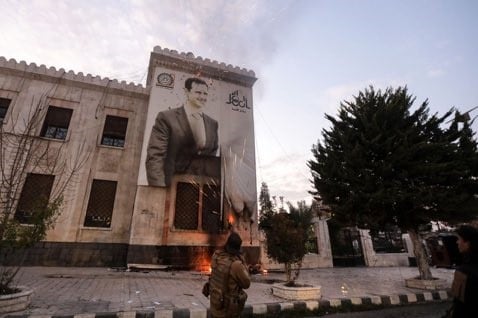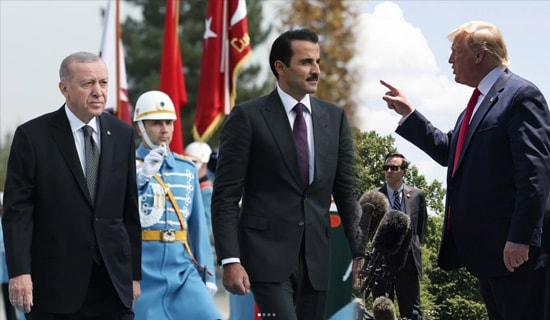After the lightning offensive by the Hay'at Tahrir Al-Sham (HTS) and other jihadi groups in Syria that toppled the Bashar Al-Assad regime, several Indian and Pakistani newspapers wrote editorials, noting the weakening influence of Iran and Russia in the Middle East as well as fearing a regional vacuum in which Al-Qaeda-linked HTS could fuel terrorism.
"Much will depend on the next few weeks, particularly how the opposition handles power, deals with officials of the [former] Assad regime," The Economic Times, an Indian daily, observed. Pakistan's liberal daily Dawn wrote: "Further instability in Syria will only help Israel, as the government in Damascus is a central pillar of the Iran-backed 'Axis of Resistance.'"
Pakistan Today, another newspaper, noted that "Syria is set to have a non-Assad president for the first time in 53 years" but HTS leader Abu Muhammad Al-Joulani "may face difficulties in dealing with the outside world" as his group is a designated terrorist group.

Bashar Al-Assad's fall marks the end of the Shi'ite regime in Syria (image: X)
The Economic Times: "Assad Is Supplanted By Forces Led By Hay'at Tahrir Al-Sham, Formerly Al-Nusra Front Affiliated With Al-Qaeda; A Takeover By An Islamist Group Raises Concerns In A Region Already Having Its Fair Share Of Them"
The Economic Times, in an editorial titled "Out with the bad Assad, in with...?" – wrote:[i] "First, the good news, for Syria and the world: an autocrat is shown the door with President Bashar Al-Assad being overthrown by Syrian rebel forces overrunning and taking control of Damascus on Sunday. This ends 54 years of the Assad family's stranglehold over Syria. But here's the cautionary tale: Assad is supplanted by forces led by Hay'at Tahrir Al-Sham, formerly Al-Nusra front affiliated with Al-Qaeda. A takeover by an Islamist group raises concerns in a region already having its fair share of them.
"Much will depend on the next few weeks, particularly how the opposition handles power, deals with officials of the Assad regime, and what immediate measures – like increasing hours of power supply – it will take to provide relief to Syrians. The internal dynamics of Tahrir Al-Sham and other groups will also be followed keenly.
"The geopolitical impact of the coup d'etat is considerable. Assad's fall disrupts the Axis of Resistance, weakening Iran's hold. Cut off from Tehran, Hezbollah is likely to be weakened, changing its dynamic with Israel. U.S. president-elect Donald Trump is clear that Syria is not 'our problem.' Like nature, West Asia abhors a vacuum.
"The Gulf Arab states, particularly Saudi Arabia and the UAE, may have made their peace with Assad's Syria. But they could quickly revert to pre-2023 pro-rebel positions and step up involvement. China, though an Assad ally, will leverage its burgeoning relationship with GCC and the infra and investment route to step in.
"Having put daylight between itself and Assad, Moscow could piggyback a diplomatic ride courtesy Beijing. India should keep a close eye on developments in the region. Working with partners like Japan, Britain and the EU, to step up when the opportunity arises will help..."
Pakistan Today: "The Middle East May Find Itself In For A Greater Shake-Up Than The Arab Spring; This Change May Provide Turkey Its First Opportunity To Intervene In The Middle East Ever"
In an editorial titled "Change In Syria," Pakistan Today newspaper observed:[ii] "While Bashar's father Hafez Al-Assad took power in 1971, he succeeded him after his death in 2000. Thus, Syria is set to have a non-Assad president for the first time in 53 years. Another major change is that the rebels are not Alawites, which is a sect of Shias. The Hayat Tahrir Al-Sham is not just Sunni, but is also designated a terrorist organization, which means that its leader, Abu Muhammad Al-Joulani, may face difficulties in dealing with the outside world. It is not known how the outside world will react, for the country has been wracked by civil war since 2011. The Hayat itself is... thought to have Al-Qaeda links. That provides it with a (rather tenuous) link to the Islamic State...
"The change reflects little gain for the USA, but a major loss for both Iran and Russia, which were both heavily invested in keeping Bashar in power, to the extent that both provided military help. In fact, a very senior figure in the Iranian Revolutionary Guard Corps was killed in an Israeli strike on Iran's Damascus consulate. Iran had also arranged for Hizbullah fighters to go from Lebanon to Syria and fight for Bashar.
"However, three developments, all distracting allies from helping him, ensured that no help was forthcoming any longer. Iran got distracted by Israel's massacre in Gaza. Russia got embroiled in Ukraine, and must now be concerned about its naval base in Latrakia, its only foreign base in the world. Hezbollah was attacked by Israel.
"The Middle East may find itself in for a greater shake-up than the Arab Spring. This change may provide Turkey its first opportunity to intervene in the Middle East ever. It also places an Islamist regime in the heart of the Arab world. This is one of those times when Pakistan has no other choice but to maintain a masterful activity, and keep its powder dry."
Dawn: "The Rebels Obviously Know What They Are Doing, For They Struck At A Time When Hezbollah, Which Played A Key Role In Defending The Assad Government, Has Suffered Major Setbacks, While Iran And Russia Are Embroiled In Their Own Conflicts"
Pakistan's liberal daily Dawn, in an editorial titled "Syria Offensive," observed:[3]
"Syria has been largely quiet since 2020 when an arrangement between Russia and Iran, which support Bashar Al-Assad's regime, and Turkiye, which backs the rebels, effectively froze the conflict. Now, it is being reignited at a time when the whole region is on a knife's edge, and conflict in one theatre can quickly spread to adjacent battlegrounds.
"The rebels obviously know what they are doing, for they struck at a time when Hezbollah, which played a key role in defending the Assad government, has suffered major setbacks, while Iran and Russia are embroiled in their own conflicts, the former against Israel, the latter managing its Ukraine war.
"However, it must be asked why the well-armed and organized rebels chose to strike the Syrian government at a time when the Palestinian people are suffering merciless violence at the hands of Israel. Surely, they could have used their capabilities to send a message to Israel in solidarity with Palestine...
"In fact, further instability in Syria will only help Israel, as the government in Damascus is a central pillar of the Iran-backed 'Axis of Resistance.' All regional states and international powers must also consider that if Al-Qaeda's ideological allies establish a strong foothold in Syria, it will fuel transnational terrorism. In this respect, the violent rise and equally violent fall of the self-styled Islamic State group should be remembered. Efforts need to be made to bring the non-violent Syrian opposition to the table with the Assad government and defeat extremist forces that threaten the entire region."




.jpg)